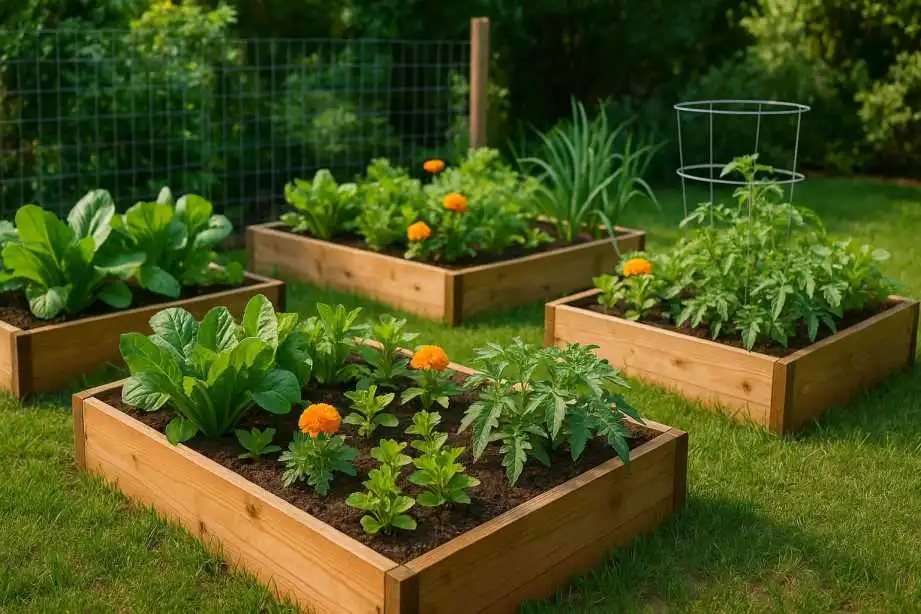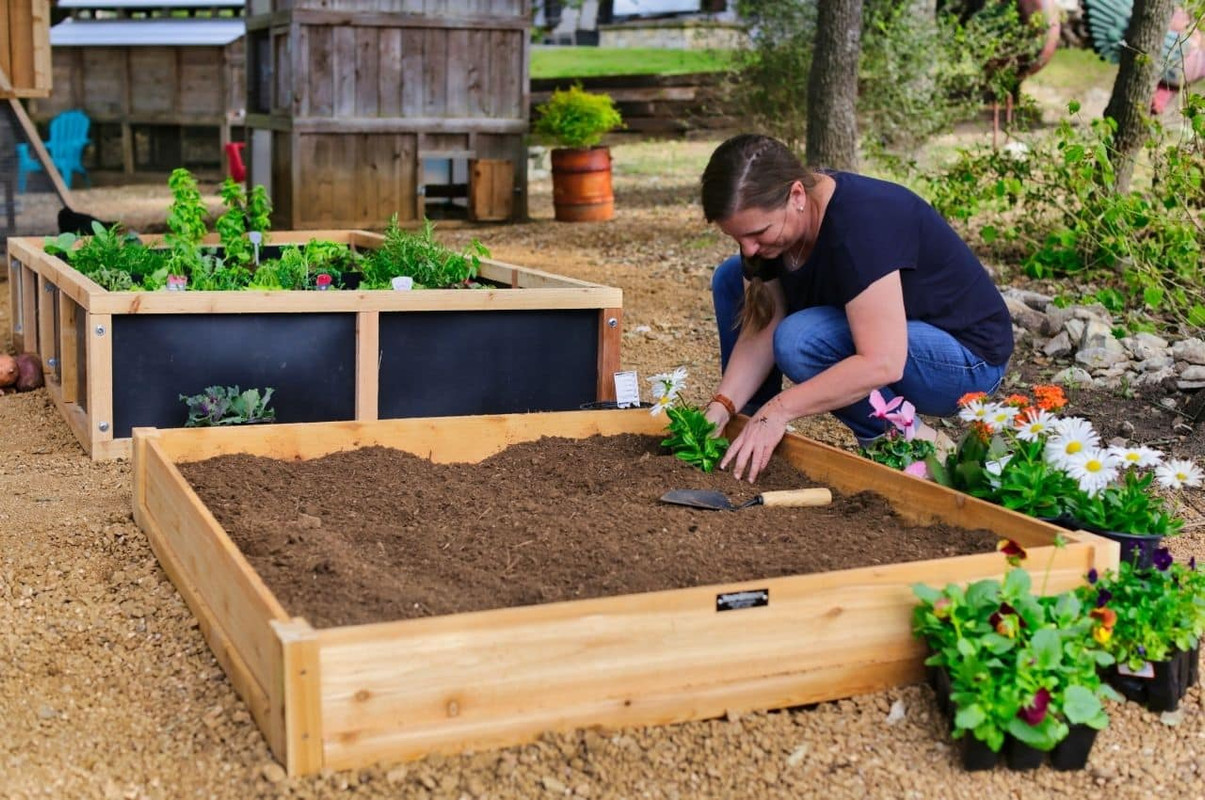
×

Gardening is more than only a interest—it is a lifestyle. And on the subject of comfort, productivity, and beauty, raised mattress gardening is fingers-down one of the satisfactory techniques for each beginners and experienced inexperienced thumbs. Whether you are managing terrible soil, limited space, or just need a neat and prepared garden, raised mattress gardening offers a global of benefits.
In this weblog, we’ll explore why raised mattress gardening has come to be this sort of popular fashion, the way to get started, and why raised beds for gardening veggies are a game-changer on your outside or balcony.

Raised bed gardening entails growing your vegetation in soil that’s accelerated above floor stage. These beds are normally framed with timber, metal, stone, or plastic, and filled with exceptional soil and compost. The structure continues the whole lot contained, handy, and viable.
Read Also: Unique Rock Garden Wall Ideas to Brighten Your Space
Unlike conventional in-ground gardens, raised bed gardening gives you whole manage over soil high-quality, drainage, and format. This makes it perfect for growing the whole lot from herbs to vegetation, but most importantly—vegetables.
If you’re wondering why greater human beings are switching to raised mattress gardening, right here are some unbeatable motives:
One of the largest frustrations in conventional gardening is poor soil. With raised beds for gardening greens, you manipulate the soil blend. You can integrate compost, topsoil, and organic rely to create nutrient-rich soil tailor-made to your vegetation.
Raised beds drain better than normal garden plots. Excess water received’t sit down around the roots, lowering the hazard of root rot and fungal sicknesses. This is especially important while you're growing root veggies like carrots, beets, and onions.
Since the beds are contained and accelerated, weed seeds are much less probable to infiltrate your lawn. You’ll spend less time weeding and extra time taking part in your plant life.
Say goodbye to backaches! Raised mattress gardening is ergonomically pleasant. You don’t want to bend down as a lot, making gardening less difficult for seniors, humans with mobility issues, or everyone who prefers a relaxed gardening setup.
If you stay in an city area or best have a small yard or balcony, raised beds for gardening veggies are a space-saving solution. You may even set up them on patios or rooftops.

Step 1: Choose the Right Location
Pick a sunny spot. Most vegetables need at least 6-eight hours of direct sunlight daily. If you're the usage of raised beds for gardening greens, daylight is your excellent buddy for healthy yields.
Step 2: Select Your Materials
Wood is the maximum common desire for constructing raised beds. Cedar and redwood are evidently rot-resistant. You also can use bricks, stones, metal, or maybe repurposed substances like vintage pallets.
Related Article: What Is Considered Early Summer for Gardening?
Tip: Keep the bed no wider than four ft so you can reach the center from both facet.
Step 3: Prepare the Base
You can location your raised bed immediately at the ground, or use weed barrier material under. This maintains weeds out even as allowing drainage.
Step 4: Add the Soil Mix
Fill your bed with a mix of:
Pretty a great deal the whole thing! But a few crops definitely thrive within the managed environment of a raised bed garden.
Pro tip: Rotate crops every season to avoid soil depletion and pest buildup.
Mulch It Up: Add a 2-3 inch layer of natural mulch on pinnacle to keep moisture, suppress weeds, and regulate soil temperature.
Water Consistently: Raised mattress gardening soil tends to dry out faster than in-ground gardens. Water deeply 2-three times every week, depending at the weather.
Install Drip Irrigation: If you're extreme about growing lots of greens, a drip system can keep time and conserve water.
Add Vertical Supports: Use cages, trellises, or stakes to support mountaineering plant life like cucumbers, beans, and tomatoes. This also facilitates maximize your space in raised beds for gardening greens.
Even in raised mattress gardening, there are some things you’ll want to persuade clean of:-
Raised mattress gardening is extra than a fashion—it’s a smart, sustainable, and gratifying way to develop food. Whether you're a newbie or an professional gardener, building raised beds for gardening veggies can transform your garden into a effective, stunning oasis.
You’ll experience healthier flowers, higher yields, and a extra enjoyable gardening experience. Plus, watching your own homegrown vegetables thrive is tremendously profitable. So why wait? Grab a few wooden, soil, seeds, and get developing together with your own raised bed garden these days!
What do you positioned within the backside of a raised lawn bed?
You can do weed barrier fabric or plain ol' burlap. For small bins and pots, you could even use espresso filters. Make certain to keep this deposit in region as you fill your bed with soil. That manner, your soil might not wash out the drain holes or the lowest of the mattress every time you water or it rains.
What are the hazards of raised garden beds?
While usually minor, raised beds do have a few risks. Raised beds dry out faster than level lawn web sites. Accordingly, they ought to be watered greater frequently in dry weather. Initial creation of the raised mattress might also take extra attempt than renovation of the traditional lawn.
What is the pleasant component to plant in a raised lawn mattress?
Most vegetables and herbs, such as tomatoes, peppers, lettuce, and basil, are appropriate for raised mattress gardens. Root vegetables like carrots and radishes also thrive in this surroundings because of the unfastened soil.
Why put cardboard within the bottom of a raised mattress?
It acts as a bodily barrier to dam out pernicious weeds. Usually, 2-3 layers of cardboard will suffice, even though you could want layers in greater weed-inclined regions. The damp surroundings created via the cardboard is conducive to earthworms and other useful soil microorganisms.
Should I put plastic inside my raised lawn bed?
It can be better to apply plastic as a liner at the inner facets of a raised lawn bed, however use a greater permeable cloth for the lowest, inclusive of landscape cloth or cord mesh. Keep in mind even though, that you want to recognise the particular form of plastic that is getting used if you are developing an herb or vegetable lawn.
.